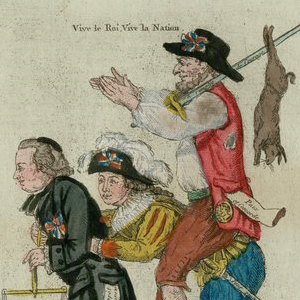Politics
Cahiers—A Parish Cahier
The cahiers de doléances ["lists of grievances"] drawn up by each assembly in choosing deputies to the Estates–General are the best available source of the thoughts of the French population on the eve of the Revolution.

The Crushed Aristocracy
This image uses the classical figures of an angel and a cherub to celebrate the achievements of Louis XVI on the base of a statue. The words state that he has destroyed the "aristocracy" and established the liberty of the French people.

The Welcoming of a Marquis in Hell
Reflecting French Revolutionary sentiments, the image points out the destruction of the nobility, depicting the arrival in Hell of a "marquis" and several other "aristocrats," described in the legend as "conspirators" and "traitors."

Internet Ancient History Sourcebook
This site was designed to provide classroom teachers with an extensive, well-organized collection of ancient Mediterranean literary texts and, to a lesser extent, art and archaeological sources.Abolition of Nobility
The major principle underlying the 4 August decree found legislative expression in the decree of 19 June 1790.

We Must Hope That It Will Soon Be Over
A common complaint of pre-revolutionary rural petitions was the abuse of seigneurial dues owed by French peasants to lords supposedly in exchange for protection and supervision.

Oath of the New Horaces
Social discrimination against old regime elites continued in this parody of a famous painting prior to the French Revolution, The Oath of the Horatii, by Jacques–Louis David which focused on the courage of three brothers who thrust their arms bravely forward to signal their willingness t

I Was Sure We Would Have Our Turn
Class solidarity was never universal, as this print celebrates the victory of the peasantry over the nobility and clergy.

Awakening of the Third Estate
With the Bastille being destroyed in the background, a member of the Third Estate breaks his shackles. Here, the clergy and nobility recoil in fear, thereby emphasizing the conflict between the estates during the French Revolution.

General Federation of the French
This image provides a visual overview of the Festival of Federation of 14 July 1790.